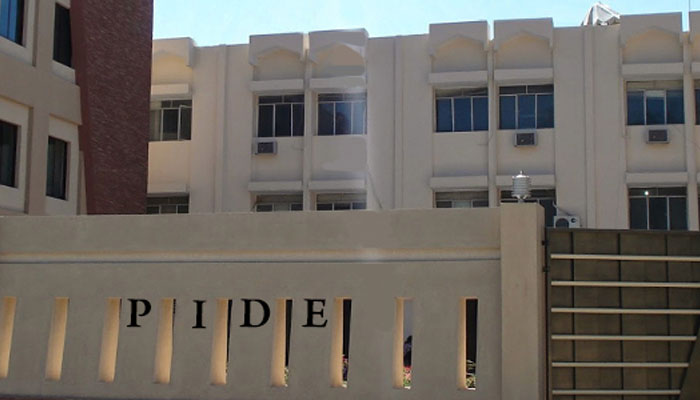PIDE for increasing EVs production to 50pc by 2035
Islamabad:Technology transfer, global value chain integration, export oriented production and reducing upfront cost are priority areas identified by Pakistan Institute of Development Economics (PIDE) in its recommendations for the upcoming Electric Vehicle (EV) policy.
These insights are based on PIDE’s recently published two books on the automobile industry of Pakistan “Driving backwards: what is wrong with Pakistan’s automobile industry?” and “Wheels of change: tracing Pakistan’s automotive evolution through political economy and technology acquisition.” The Prime Minister of Pakistan in September 2024 had directed the government to present a new policy for accelerating EV manufacturing and increase user adoption across the country. In response to the Prime Minister’s call for a robust EV policy, PIDE presented its set of recommendations “Future on wheels” to support the development of an effective policy framework.
PIDE recommends devising a long term policy for development of EV Industry in Pakistan with short term goals for 2030, medium term targets till 2035 and long term targets set to be achieved by 2040. These include 10% of all new 4-wheelers and 25% of all new 2/3 wheeler sales to be EVs by 2030, while increasing the shares of the former to 50% and latter to 75% by 2040. PIDE also recommends increasing production of EVs in Pakistan to produce 50% of all new 4 and 2/3 wheelers in Pakistan as EVs by 2035.
The policy recommendations by PIDE emphasise integrating the country’s automobile industry into the global value chain of automobiles, EVs in particular. This is possible only when the custom duties on import of EV inputs are lowered while production of EVs and EV parts and components is increased manifolds to enhance exports. PIDE recommends targeting 10% of all EVs and 5% of auto parts produced to be exported by 2030 while 50% of all EVs and auto parts both produced in Pakistan must be exported by 2040.
For this purpose, the government must take steps to facilitate joint ventures between existing automotive firms in Pakistan and foreign firms to enhance production of EVs, parts and components through Transfer of Technology and Capital Investment. G2G and G2B basis engagement must be carried out for attracting investment and manufacturing in Pakistan. The State Bank of Pakistan is also encouraged to devise a Green Financing Plan for provision of financing through commercial banks to support the growth of EVs and EV parts and components manufacturing in Pakistan, with keen focus on establishment of new or expansion of existing manufacturing facilities and setting up of charging facilities.
Future on Wheels, PIDE’s policy viewpoint, emphasises that the adoption of EVs is not just an environmental imperative but also an economic opportunity. A well rounded and effective policy, building on the lessons learned from previous policies will set the stage for Pakistan to leapfrog into a sustainable future, said a statement.
-
 Why Prince William Releases Statement On Epstein Scandal Amid Most 'challenging' Diplomatic Trip?
Why Prince William Releases Statement On Epstein Scandal Amid Most 'challenging' Diplomatic Trip? -
 Historic Mental Health Facility Closes Its Doors
Historic Mental Health Facility Closes Its Doors -
 Top 5 Easy Hair Fall Remedies For The Winter
Top 5 Easy Hair Fall Remedies For The Winter -
 Japan Elections: Stock Surges Record High As PM Sanae Takaichi Secures Historic Victory
Japan Elections: Stock Surges Record High As PM Sanae Takaichi Secures Historic Victory -
 Prince William, Kate Middleton Finally Address Epstein Scandal For First Time: 'Deeply Concerned'
Prince William, Kate Middleton Finally Address Epstein Scandal For First Time: 'Deeply Concerned' -
 Kim Kardashian Promised THIS To Lewis Hamilton At The 2026 Super Bowl?
Kim Kardashian Promised THIS To Lewis Hamilton At The 2026 Super Bowl? -
 Andrew Mountbatten-Windsor Throws King Charles A Diplomatic Crisis
Andrew Mountbatten-Windsor Throws King Charles A Diplomatic Crisis -
 Barack Obama Hails Seahawks Super Bowl Win, Calls Defense ‘special’
Barack Obama Hails Seahawks Super Bowl Win, Calls Defense ‘special’ -
 Pregnant Women With Depression Likely To Have Kids With Autism
Pregnant Women With Depression Likely To Have Kids With Autism -
 $44B Sent By Mistake: South Korea Demands Tougher Crypto Regulations
$44B Sent By Mistake: South Korea Demands Tougher Crypto Regulations -
 Lady Gaga Makes Surprising Cameo During Bad Bunny's Super Bowl Performance
Lady Gaga Makes Surprising Cameo During Bad Bunny's Super Bowl Performance -
 Paul Brothers Clash Over Bad Bunny's Super Bowl Performance
Paul Brothers Clash Over Bad Bunny's Super Bowl Performance -
 South Korea: Two Killed As Military Helicopter Crashes During Training
South Korea: Two Killed As Military Helicopter Crashes During Training -
 Elon Musk Unveils SpaceX’s Moon-first Strategy With ‘self Growing Lunar City’
Elon Musk Unveils SpaceX’s Moon-first Strategy With ‘self Growing Lunar City’ -
 Donald Trump Slams Bad Bunny's Super Bowl Performance: 'Absolutely Terrible'
Donald Trump Slams Bad Bunny's Super Bowl Performance: 'Absolutely Terrible' -
 Jake Paul Criticizes Bad Bunny's Super Bowl LX Halftime Show: 'Fake American'
Jake Paul Criticizes Bad Bunny's Super Bowl LX Halftime Show: 'Fake American'




